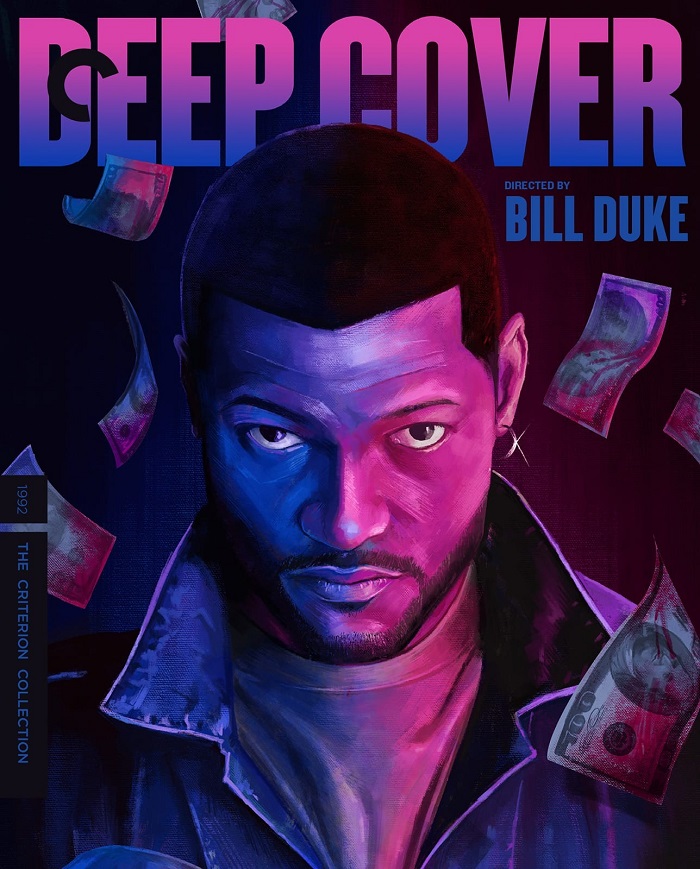
Russell Stevens (Laurence Fishburne) is a good cop. He’s also a black man. And a good, black cop is exactly what the DEA is looking for. They need a man to go undercover to try to take down a drug cartel in Los Angeles. Stevens will take to the streets and work his way up the organization. Along the way, he’ll sell drugs, take drugs, and commit acts of violence. He will become a criminal in order to stop the criminals.
That’s a boilerplate plotline we’ve seen in countless movies and television shows. What distinguishes Deep Cover from the rest is in the way it wrestles with its own morality. Nearly every main character spends time pondering the rightness or wrongness of their actions. The film also takes a step back from the main action to look at the morality of the entire drug war. It is a smart, beautiful-looking neo-noir with a conscience.
Stevens starts by buying as much cocaine as he can from street dealers. This gets him noticed by David Jason (a somewhat toned-down Jeff Goldblum) a mid-level dealer with connections to the main Colombian distributors. At each step of the ladder, he gets closer to the target and compromises himself a little more. The line between good cop and bad criminal becomes increasingly blurred.
His boss, DEA Special Agent Gerry Carver (Charles Martin Smith), doesn’t care about the minor (or even major) infractions Stevens might be committing in the line of duty. He wants results. He needs a big fish (but not too big) so he can look good in front of his bosses. He’s eyeing a job in Washington. When Stevens starts to get close to the big boss, he’s told to back off. That guy has connections. He knows the President. This is the game we pretend is the war on drugs. Arrest a few dealers, stop some distributors, but leave the big manufacturers alone. They have the money which means they have the power.
In the original script, Stevens was a white man. But with the success of films like New Jack City and Boyz in the Hood they changed the character into a black man and hired Bill Duke to direct, turning what would have likely been a completely forgettable crime thriller into one of the better films of the early 1990s.
Duke, along with cinematographer Bojan Bazelli, shot it like a neo-noir filled with deep shadows, beams of light, lots of dark blues and reds. The morality of the characters is murky and the story is as black as its main character. Unlike so many film noirs of the 1930s and 1940s, which were full of almost exclusively white characters, this is a story filled with black characters and Hispanic characters. People of color fill the screen. People of color are abused by the system at every turn. It is so smart about how it handles that too. Unlike most film noirs, there is no femme fatale either. The one major female character acts as a moral center. She’s a high-class art dealer who doesn’t mind getting her hands a little dirty by laundering David Jason’s money, but when things start to get violent, she wants out. She asks Stevens to do the same. Actress Yvette Heyden imbues the character with soul and heart.
It is filled with all the requisite scenes this type of film needs. There are shoot-outs, and shout-outs, tense moments when Stevens’ cover might get blown, and a little sex. It stays true to its genre roots, while still staying smart about it and giving the film a depth and social conscience.
Laurence Fishburne (billed as Larry Fishburne for the last time here) is excellent. He transforms Stevens from a mild-mannered, squeaky clean cop into a brutishly clever gangster with ease. Jeff Goldblum tones his usual schtick down (though there is still a scene in which he’s flying down the road, hanging out of a window shouting “Let’s have dinner. We’ll have shrimp.” to his pursuers).
It is a genre film that can surprise you. A film that takes the conventions of the genre and doesn’t so much as up-end them, but pulls them back and examines them, exposing something much bigger in the process. Stevens isn’t just a pawn in this game, but a pawn’s pawn. Even his bosses and the drug distributors are pawns in a game they don’t know they are playing.
The Criterion Collection presents Deep Cover with a new 4K digital restoration and a 2.0 surround DTS-HD Master Audio soundtrack. Extras include a new interview with Bill Duke an archival interview with Bill Duke and Laurence Fishburne from 2018, plus a couple of conversations about the film from film critics. Also included are the usual trailers and an essay in the full-color booklet.